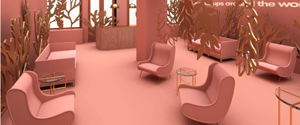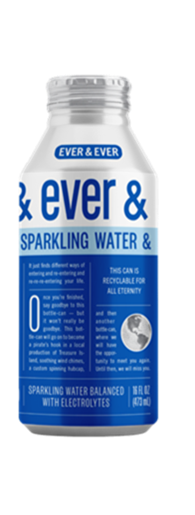Like plastic straws, the world’s consumption of plastic water bottles is a growing problem: 500 billion plastic bottles are used around the globe annually.
Lonely Whale, the non-profit centered on ocean health, has hatched a new campaign to help combat that staggering number. The social media challenge, “#HydrateLike (you fill in the blank),” is being launched in conjunction with the “Question How You Hydrate” campaign it hopes will start a movement that empowers consumers to choose and champion sustainable alternatives to single-use plastic water bottles.
The campaign, in partnership with Point Break Foundation and creative agency Young Hero, asks individuals, organizations and brands to pledge their commitment to remove single-use plastic water bottles from their daily routines and replace them with sustainable alternatives, such as reusable bottles, household cups or aluminum cans.
The communication strategy includes a PSA (Plastic Service Announcement) that demonstrates commitments already made from celebrities and environmental leaders, including Zooey Deschanel, Aidan Gallagher, Holly Frazier and Nia Sioux. Also joining the movement is “Game of Thrones” and “Aquaman” star Jason Momoa, who recently pledged his commitment to the campaign.
The planning
About a year ago, Lonely Whale conducted research to understand who uses single-use bottles the most and to target those individuals with an impact campaign to shift behavior.
“We found out it was Millennial mothers of Caucasian and Latina decent,” Emma Riley, director of strategic partnerships, Lonely Whale, says. “Our campaign grew out of knowing that we needed to reach that target.”
The messaging in the campaign asks individuals to challenge themselves in the way they are consuming water through traditional, holistic marketing. More than 30 pieces of content are being released beginning today and throughout the summer across social media, as well as 50 non-profit partner channels, along with the PSA.
“What we hope to see is a very similar reaction to strawless, the feeling of being part of positive change,” Riley says. “We know that self-identification with a cause is a big means to an end with the Millennial and Gen Z markets. The way that we have produced our content is to reflect that self-embodiment of the cause.”
In 2017, Lonely Whale launched the Strawless Ocean initiative to remove 500 million plastic straws from the U.S. waste stream. It is also behind the #StopSucking campaign that focused attention on the use of plastic straws. Within eight months of the release of strawless, the only single-use alternative straw surged in demand by more than 5,000 percent.
On the ground

The social strategy for “Question How You Hydrate” is supported by a pop-up, the Museum of Plastic, at 473-475 Broadway i, open June 8 – 12. The museum is an interactive space of unique rooms designed to create a vision of a world without waste and inspire action to make a positive impact.
“The idea is to showcase a world without plastic, highlighting for consumers the issues, but also the alternatives,” Riley says. “It is an immersive experience for people to understand the issue and how they can make small changes in their lives.”
A strategic partner
One brand that is part of the exhibit and an integral part of the campaign is Vita Coco. The brand has been working behind the scenes with Lonely Whale for over a year to bring a premium water product to market that would address the specific need Lonely Whale is highlighting in the campaign.
“When we began to plan our campaign we realized we needed a single-use alternative that could scale if demand required it, that is highly recyclable, highly recycled, a material of value,” Riley says. “The idea came to launch a new water within aluminum. It was a massive opportunity within our campaign and we had yet to find a partner.”
 Vita Coco’s new product, Ever & Ever, is a sustainable alternative to plastic water bottles. The beverage comes packaged in a recyclable aluminum can.
Vita Coco’s new product, Ever & Ever, is a sustainable alternative to plastic water bottles. The beverage comes packaged in a recyclable aluminum can.
“We are aware that we are a single use company. In thinking about expanding our footprint beyond coconut water, and the responsibility to our broader sustainability strategy, we worked with Lonely Whale on how to neutralize the impact of single use containers,” Jane Prior, CMO of Vita Coco says. “We realized an opportunity to play in premium water in a way that is unique and against an issue that is not being truly addressed. It’s a lofty goal, but something we wanted to think about.”
Prior says that the choice of aluminum made sense and that it is infinitely recyclable and recycled and doesn’t lose any of its integrity during the recycling process.
“Seventy-five percent of all aluminum made is still around today,” she says. “That drove us to aluminum being the right packaging. If consumers correctly recycle it, it can essentially live forever. An aluminum can, can come back on shelf within 60 days. It doesn’t lose its quality.”
Over the next six months, marketing and availability of Ever & Ever will be focused on New York City and will then expand into national retailers early next year. Summer sampling events will activate through partnerships with events and festivals like LaLuna Festival around NYC and in The Hamptons. Online, the beverage is available at Amazon.com and the website, drinkeverandever.com.
“Marketing will be very New York centric,” Prior says.
Marketing will also be digitally focused, as well as through influencer programs, a mainstay in building the Vita Coco brand. Next year, more traditional marketing will kick in.
The blue and white packaging on the resealable Ever & Ever can is content heavy and includes information about Lonely Whale. For example, one section reads: “Once you’re finished say goodbye to this bottle-can—it won’t really be goodbye. This bottle-can will go on to become a pirate’s hook in a local production of Treasure Island, soothing wind chimes, a custom spinning hubcap and then another bottle-can, where we will have the opportunity to meet you agin. Until them, we will miss you.”
“This is an issue that requires a lot of education,” Prior says. “We’re really leveraging the packaging to tell the story. It’s purposefully copy heavy so we can help consumers see the value in the packaging and help them put it back into the circular economy.”
One million single-use plastic bottles are sold every minute around the world. According to Fact.MR, revenue generated from water sold in bottles is projected to reach $200 billion by the end of the year 2022. By contrast, Transparency Market Research reports that the reusable water bottle market is projected to only reach $10.19 billion by the year 2024.
“The world is in a totally different place now, this is trendy, people care about plastic and it will be interesting to see how receptive this audience is to the cause at large,” Lonely Whale’s Riley says.


 Network
Network

